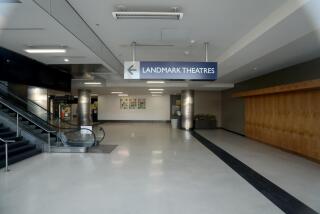FILLMORE : Grant Called Vital to Medical Office’s Survival
- Share via
Andrew Griffel walked among the temporary shells housing the Fillmore medical clinic Monday afternoon and was impressed.
“It’s wonderful how they were able to rebound so quickly,” said Griffel, executive director of the American Jewish World Service, a New York-based foundation that donates money to needy relief organizations around the globe.
The organization donated $52,000 to help Clinicas del Camino Real reopen in temporary quarters after the Jan. 17 earthquake destroyed its downtown medical office.
The afternoon tour Monday convinced Griffel that the donation has made all the difference. “They managed to salvage all their records and some of their equipment, and they’ve turned it around,” he said.
Clinicas del Camino Real operates four facilities in Ventura County to serve the area’s poor and needy. It opened seven modular units in a park behind City Hall with the money it got from American Jewish World Service.
The other facilities, in Oxnard, Ojai and Saticoy, were undamaged in the earthquake. But the Fillmore structure was so badly destroyed that its directors feared that they could never afford to reopen.
The grant from American Jewish World Service, which came last month, changed all that.
“It fills a gap that we are obviously going to have until we see some of the (federal) dollars coming in,” said Jack Hinojosa, associate director of Clinicas del Camino Real.
“From a financial standpoint, it gives us a little more breathing room,” he said. “It helped us get over the hump.”
Griffel said most of the projects that his organization chooses to fund are overseas. But when the earthquake struck Southern California, he began looking around for worthy groups at home.
“This (program) here seemed to have many of the criteria,” he said. “We found they did excellent work and just decided to go for it.”
Clinicas del Camino Real last year treated more than 60,000 patients at its four facilities, Hinojosa said. It saw another 70,000 people under a number of off-site medical programs, he said.
“It’s nice to see,” he said, “not only from a financial standpoint, but to get some recognition for the work we’ve done for more than 22 years.”
More to Read
Sign up for Essential California
The most important California stories and recommendations in your inbox every morning.
You may occasionally receive promotional content from the Los Angeles Times.













